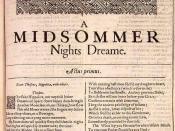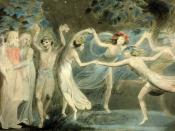Romanticism can be defined as a literary, artistic, and philosophical movement originating in Europe. It emphasized the individual, the subjective, the irrational, the imaginative, the personal, and the spontaneous. (Merriam-Webster) Romanticism can be characterized by it's appreciation for the beauties of nature; a general exaltation of emotion over reason, and of the senses over intellect. Emphasis is placed on imagination and it's role as a access point to awe-inspiring experience and spiritual precision.
In William Shakespeare's "A Midsummer Night's Dream", magic and fantasy invoke Romanticism is a dream-like state. The play is set in Theseus' Athenian palace. Shakespeare is purposely set it in a vague antique period with the goal of it being a fantasy suitable for the magic of a summer night in a never-never place and time. (Gianakaris). In the play, the four main characters believe in romanticism. It is also evident in the imagery, language, and setting throughout "A Midsummer Night's Dream".
Demetrius and Lysander both speak in figurative language and both are very handsome. Their love for Helena and Hermia deal mainly with physical attraction and flirtations acts than love that captures mind, body, and soul. All of them appear to be in love with love, more so than in love with each other. They all frantically run about, each changing partners so often that one is never really sure of who loves whom. Each consume themselves with what they consider to be real love to the point of losing touch completely with the real world. To them, love is a fairy tale, which involves no reason. They all believe that falling in love involves nothing more than romantic speech and desire for each other. Helena is one of the silliest characters in the play, and at times can be quite irritating.


